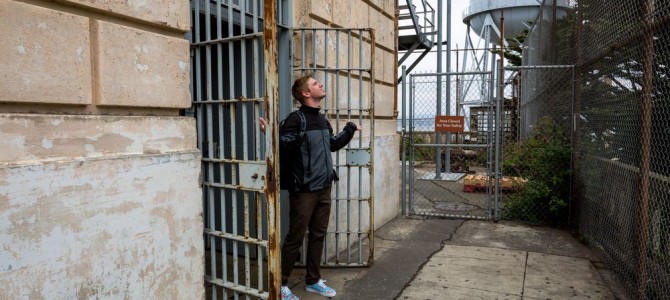
Melissa Huffman is clearly an in-demand person. Her body is covered in buzzers and bells; several sounds are emanating from her person at this very moment. Even so, she pauses to shake my hand as she bustles through the lobby. “This place matters,” she tells me gravely, before rushing off to take a call.
The place is RecycleForce, an Indianapolis-based recycling plant that employs recently incarcerated men and women for 120-day rotations as they transition back into community life. By giving the newly released a real job in a structured, programmatic environment, RecycleForce tries to help them develop the skills and life habits they need to make it on the outside. It’s one of a whole network of organizations devoted to “re-entry”: helping former criminal offenders get their lives on track.
Huffman once came through RecycleForce’s re-entry program. Now she works as their shipping and receiving manager, and is obviously integral to the organization.
Why Re-Entry Matters
April 24-30 was National Re-Entry Week, highlighted by the Obama administration as an occasion for discussing the re-entry challenges for former offenders. If you weren’t aware of this gala occasion, you’re forgiven. Conservative organizations don’t normally seize their talking points from Barack Obama’s White House (Although the American Enterprise Institute hosted a very interesting colloquium on the topic, now available for streaming.)
Still, we really should get in on this discussion. Many states are shifting some of their justice-related resources away from incarceration, and towards better parole and probation programs. Conservatives tend to find this uncomfortable and potentially worrisome, for good and understandable reasons. Those are the same reasons our contributions are needed.
Conservatives value limited government and the individual (and communal) self-sufficiency that supports it. Re-entry organizations deal primarily with adults who pretty obviously are not fit to be left to themselves (and who are likely to be a public safety risk if we do just leave them alone). How should conservatives, as natural lovers of freedom, feel about this situation? It requires a much more nuanced response than a rousing “Don’t Tread On Me.”
Conservatives also like to insist that crime has a moral element in addition to the social one. Where liberals are often inclined to see criminal offenders just as victims of a broken society, we tend to reject that view. Criminals aren’t forces of nature, like tornadoes or floods. They’re rational persons who choose to violate our laws and harm others. That affects their victims as well; in general it’s more psychologically scarring to be hurt intentionally by a person than to suffer the same material harm from an accidental fall or a natural disaster. It’s important to recognize the moral dimension of crime if we’re to respond appropriately.
That insight really is crucial, but applying it is simpler from the prosecutor’s office. Conservatives won elections for decades by insisting we should punish wrongdoers instead of excusing them. That’s fine as far as it goes, but what happens when we max out our capacity for punishment? In a nation rife with social breakdown, it’s just not feasible to incarcerate all of our felons for life. Some attention must be given to rehabilitation, especially now that social research has given us reason to believe that it is possible for at least a sizable portion of our inmate population.
After interviewing or interacting with dozens of re-entry professionals, I’ve made a list of six things conservatives should know about them. Appreciating the reality on the ground might help us find our way into the conversation. Of course, it should be said upfront that these are generalizations. Not every re-entry worker will fit the mold. Still, these personal impressions may help capture the general spirit of the field.
1. They Don’t Greatly Care What You Did
Mary Leffler doesn’t talk like an activist, but she does use the phrase “vulnerable populations” a lot. As division director of the Indianapolis branch of Volunteers of America, she has spent a lot of time around “vulnerable populations”: that bottom 20 percent of the American income chart that shows worrisomely little mobility. She knows a lot about addiction, family breakdown, and, yes, incarceration.
Leffler clearly cares about her clients. But she’s upfront about the fact that, to her, criminal histories (and attendant legal complications) are just another practical problem to manage. Volunteers of America maintains facilities that throw together struggling clients with a variety of problems: parolees, addicts, questionable parents in danger of losing their kids. “For us, whatever door you come in, you look really similar, because you present most of the same kinds of issues. So our response doesn’t have to be that different. It can be pretty systemic.”
This is fairly typical of re-entry workers (although religiously based organizations are sometimes outliers in this regard). They’re used to dealing with people in crisis. To them, custodial restrictions and other legal restrictions just go on the list of problems to be managed.
2. The Latest Social Justice Craze Isn’t That Important
Talking to re-entry workers about criminal justice reform, I didn’t hear a word about Black Lives Matter. When I asked people why they went into the field, nobody mentioned Michelle Alexander’s “The New Jim Crow.” In a few instances, I threw out names of pundits or activists who have been prominently involved in lobbying for or against justice reform. I got blank stares.
On the ground, these workers seem very fixated on the practical, day-to-day realities of keeping people employed, fed, and out of prison. They’re life coaches to the desperate and dysfunctional, and if they have strong views on politics or racial dynamics, they didn’t see fit to share them with me.
Of course, it does not follow that pernicious ideology has no effect on the justice reform process. Activism probably does have some influence at the political and legislative level. It’s still interesting to find that the people working directly with former offenders are, for the most part, not starry-eyed ideologues. I suspect the starry-eyed ones, in general, don’t last very long in the field.
3. They Hate Bureaucracy As Much As You Do
Whether or not they’re licensed social workers, most people go into re-entry work because they want to help. Helping people pull their lives together is a lot harder when you’re constantly hamstrung by bureaucratic red tape. Earmarks and bureaucratic restrictions make it harder for re-entry workers to bring their clients the stability and continuity that their chaotic lives desperately need.
A constant refrain for re-entry workers is: we want the autonomy to assess individually what our clients really need. One employee of a faith-based organization told me she had left a more secure job in the public sector largely because she wanted the freedom to respond more holistically to her clients’ problems. As a state-employed social worker, she was constantly receiving irksome new rules or regulations from bureaucrats “who just didn’t know what it’s really like to work with a crack addict.”
After finishing this tirade, she trailed off uncertainly and then asked, “Does that make sense?” Friend, I’m a conservative. It makes all kinds of sense to me.
4. They Know Family Matters
When conservatives diagnose social breakdown, they love to return to two points: work and family. These are indeed critically important. But re-entry workers don’t need a lecture on Daniel Patrick Moynihan and the collapse of the black family. They know. This live this reality every day, and they’re well aware their clients need jobs and family ties.
At Volunteers of America, Leffler proudly showed me the video her organization had produced in cooperation with “Sesame Street,” designed to help kids cope with the challenges of having an incarcerated parent. “Little Kids, Big Challenges” may make you want to cry, but it’s just life for more than two million American children, and re-entry workers know all about that.
Recognizing the catastrophic impact of fatherlessness on at-risk children, VoA has also been working more aggressively of late to extend their family preservation efforts to incarcerated fathers. “Men are harder,” Leffler admits, “because they often have multiple family units.” Figuring out which men have real relationships with which children is a saga in its own right. But they’re still trying. They know kids need their dads.
5. They Know Work Matters
Andrew King is RecycleForce’s director of inventory and quality control. He’s clearly a geek, meaning his childhood was probably filled with model planes and dissected kitchen appliances. He’s also a former offender with a deep commitment to re-entry work.
Combining these passions together, he is now an entrepreneurial recycling wizard, constantly looking for new ways to make money from other people’s old junk. If the plant makes more money, it can provide more jobs for the recently incarcerated.
“I came through the program just like everybody else,” King tells me as we walk the floor. “When I was on the floor, I got curious: why do we [the plant] not like TV’s? So I took a whole bunch of them apart, weighed and averaged them, and then made up tables for all the prices. Then I did that for all the products.” His enthusiasm has obviously borne fruit. Proceeds from RecycleForce’s operations now cover about half of the total costs of its re-entry program, and King is clearly a part of that equation. As we chat, he breaks off periodically to field a question from a hard-hat-clad worker. They know where to come for answers.
When RecycleForce first started in 2006, it had two employees and processed 600,000 pounds of recyclable materials in one year. Today 75 employees process 6 million pounds each year. Grimes tells me they’re “reclaiming the value” both of recycled materials, and of human lives.
6. They Just Want to Do What Works
“Data-driven” is a big buzz-word in the re-entry business. Speaking to people in the re-entry field, I was reminded of parents of high-need children, and how they’re constantly scrambling to get the latest book on discipline or developing healthy sleep patterns. “Data-driven” seems to be the re-entry equivalent to that latest, greatest book.
Don’t misunderstand, though. The job is hard and stressful, and the people who do it are frequently frazzled, but some things really do work better than others. There seems to be a widespread commitment across the field to figuring out what really helps.
Are there reasons to be concerned about the growing influence of benevolent technocrats in our justice system? Absolutely. Crime is a problem with serious moral and social dimensions, and it’s important to keep sight of those in our scramble to “find what works.” At the same time, it’s hard to deny that re-entry workers are doing important and necessary work, often with admirable prudence and conviction. Anyone who wants to argue against the reform process needs to have a realistic appreciation for how much they contribute.
Given that a large (and probably growing) number of our compatriots belong to “vulnerable populations,” these problems aren’t going to go away. We need to prepare ourselves for a complicated conversation about crime, redemption, and re-integrating our struggling compatriots into our society.









